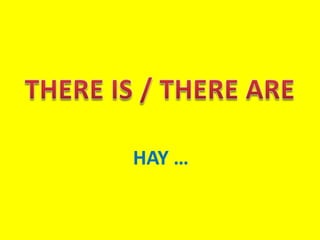There is there are
•Als PPTX, PDF herunterladen•
0 gefällt mir•1,670 views
El documento explica la diferencia entre "there is/there's" y "there are" en inglés. "There is/there's" se usa para indicar un solo objeto en singular, mientras que "there are" se usa para objetos en plural. Proporciona ejemplos como "there's a school" y "there are two town halls" para ilustrar cómo se usan correctamente estas expresiones.
Melden
Teilen
Melden
Teilen

Weitere ähnliche Inhalte
Was ist angesagt?
Was ist angesagt? (20)
Mehr von Pili Calvo
Mehr von Pili Calvo (20)
There is there are
- 1. HAY …
- 2. THERE IS = THERE’S THERE ARE • Significa: hay • Se utiliza para decir lo que hay en un sitio, por ejemplo, en una ciudad.
- 3. THERE IS = THERE’S Utilizamos esta estructura cuando hablamos de una sola cosa, es decir, cuando está en singular. Por ejemplo: There’s a school = There is a school There’s a park = There is a park There’s a museum = There is a museum
- 4. THERE ARE Se utiliza cuando el sustantivo está en plural, es decir, hay más de uno. Por ejemplo: There are two town halls. There are four libraries. There are three cinemas.
- 5. From: Pili Calvo C.E.I.P. “Alto Aragón”
